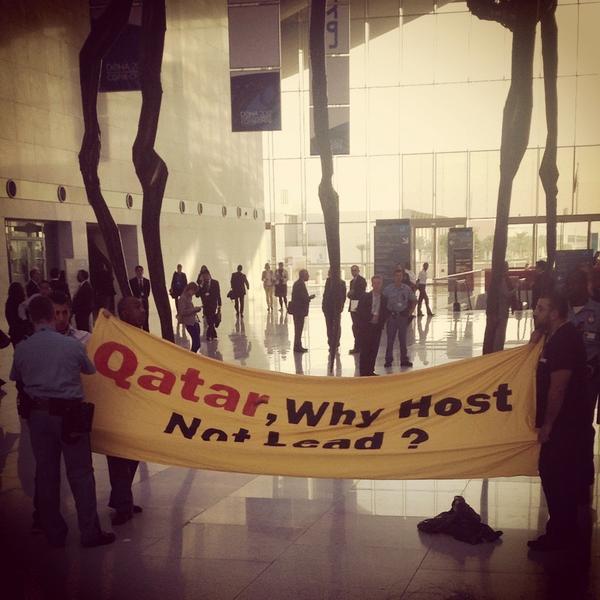Change the conversation, support rabble.ca today.
This year’s relatively quiet climate negotiations turned up the volume yesterday when two members of the Arab Youth Climate Movement (AYCM) were arrested for holding up a banner. Onlookers erupted in cheers as they were escorted out. They were asking the hosts, the Qatari government, for leadership. Instead, they were immediately ejected from COP18 and instructed to leave the country.
After the cheers subsided, the mood was sombre. The process at COP18 is failing; the climate deal on the table is not an ambitious one. It is not sufficient to avert the climate catastrophe that will occur if emissions are not curbed. Civil society has been speaking loudly and clearly at COP, through the AYCM’s action and others, demanding initiative on the part of governments. But are they listening?
The silence was also broken for the first time between Canadian climate groups and Environment Minister Peter Kent. Despite asking for meetings in past years, requests have been consistently denied. In his tenure as Environment Minister, Kent has met with environmental groups four times, and on non-climate issues. He has met with representatives of the oil and gas industry 54 times, and many of these meetings focused on tar sands advocacy.
Hannah McKinnon, director of Climate Action Network Canada, opened the meeting with the Environment Minister. “It has been a difficult year for us in terms of political engagement because of some of the hostile rhetoric from your government.” In the past year, environmental groups have been labelled terrorists and accused of money laundering.
McKinnon continued, “You will have to excuse us for not coming in with the assumption that there dialogue will be ongoing, and taking the opportunity to make sure as many voices as possible are represented here today. That said, we do hope this only the beginning of many meetings to come.”
Collectively, we read statements from constituencies that the Environment Minister needs to be consulting. We shared the voices from First Nations, workers’ unions, Canada’s youth, and global front-line communities hit hardest by climate impacts. We also delivered close to a thousand tweets from concerned citizens demanding clarification on Environment Canada’s inadequate policies.
After Kent’s twenty-minute reply, the feeling in the room transformed from dismay to despair. The dozens of Canadian students, workers, scientists, and leaders who had travelled to Qatar were hoping for Canadian leadership. At the very least, we were hoping for less obstructionism within the negotiations. In that meeting, here were no words from the Canadian government to support our hopes.
Climate change is the single biggest issue facing the entire globe. We need meaningful action from our government, and we are not seeing it. Canada just claimed its sixth Colossal Fossil award, marking it the most obstructive country at these negotiations for the sixth consecutive year. Canada has been shirking the commitments it made at past conferences, like Copenhagen. At a critical moment during COP18, the chair called out Kent in front of the entire UN for not paying attention.
Now that dialogue has opened between our Environment Minister and the civil society groups he needs to hear from in order to perform his job, perhaps Canada’s performance at the next climate negotiations will be better. With the input from affected Canadians beyond the oil and gas lobby, perhaps our minister will be encouraged to pay closer attention to the process Canada is known to obstruct.
It is hard to say if an honest and open dialogue will continue between environmental groups and the head office of Environment Canada. It may be that Kent met with us out of a desire to begin that process. Of course, he may only have met with us because we spotted him in a restaurant at COP18 and demanded the long-overdue opportunity to speak face-to-face.
COP18 is closing, and what is on the table an inadequate deal that will not protect Canada or any other country from the devastating effects of a warmed planet. Furthermore, Canada has embarrassed itself on the international stage yet again. Canada must take the lead so others will follow; so young people do not have to be arrested for requesting ambition from their leaders. Now that the silence has been broken, perhaps bureaucrats in Canada and worldwide will begin to listen.
Alana Westwood is a writer, research, and activist, though not necessarily in that order. She is a member of this year’s Canadian Youth Delegation (CYD) to COP18. The CYD advocates for young Canadians at United Nations climate negotiations and holds our government accountable for their actions at these talks. You can follow the CYD’s activities at COP at www.cyd-djc.org and #CYD_DJC. Keep up with Alana at www.alanawestwood.com



